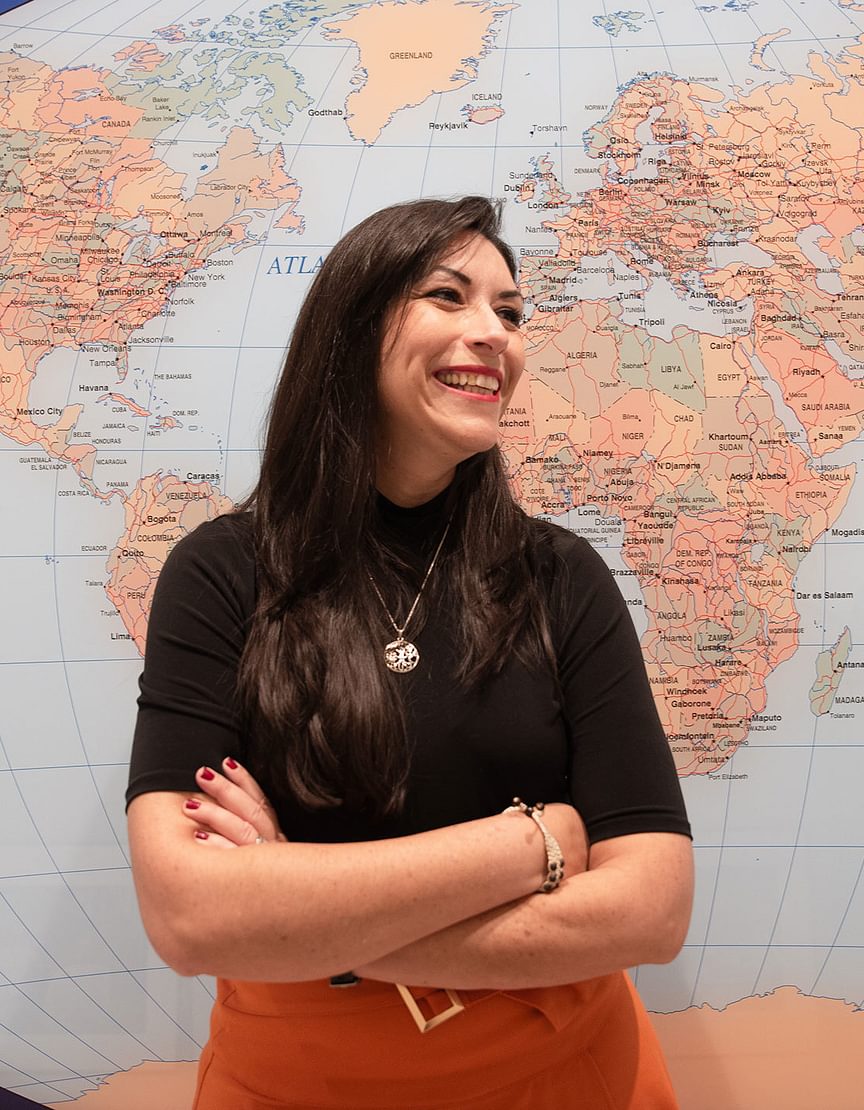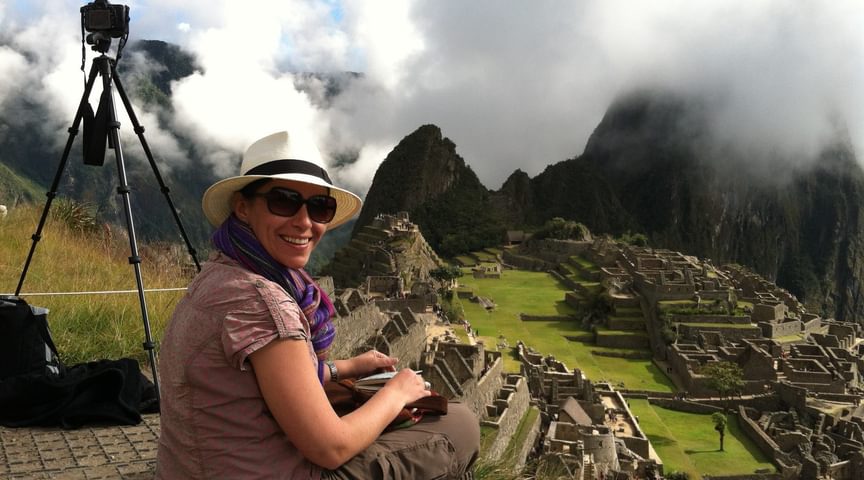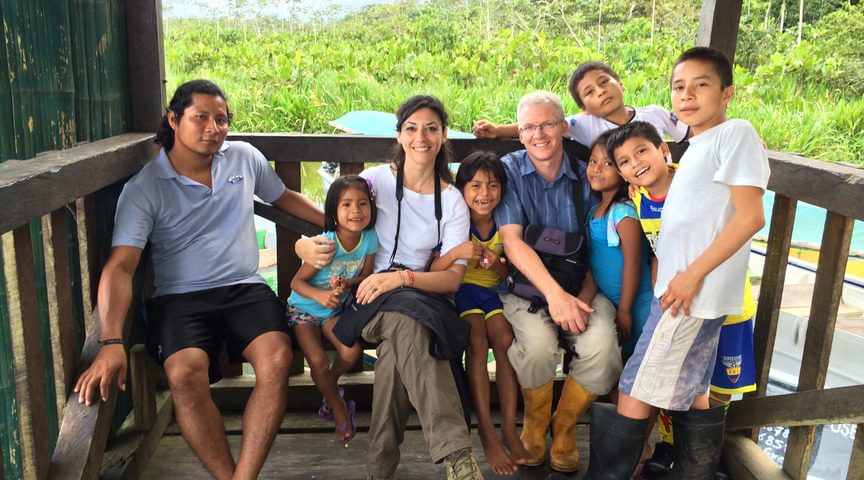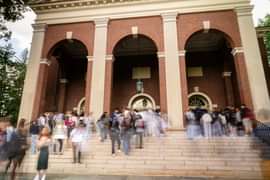
March 04, 2020
The world in her hands
Learning in the World Director Carmen Muñoz-Fernández has expertly managed this popular student travel program.by Allyson Irish
When Carmen Muñoz-Fernández was growing up in Talarrubias, Spain—a region known for its famous jamón ibérico (Iberian ham)—she dreamt of becoming a teacher and of traveling the world. Both of those dreams have come true.
As she completes her term this spring as inaugural director of Andover’s Learning in the World Program (LITW), Muñoz-Fernández reflects on her life of teaching, her experiences with other cultures, and the future of student travel at PA.
When was your first trip outside of Spain?
When I was in college [in Spain], my dream was to travel. I wanted to come to either the United States or England. England was closer and there were scholarships. There’s a scholarship in Europe called the Erasmus Grant. Basically, it’s an exchange program where students from one country can go to another country to study for a year. I was lucky enough to receive one of those scholarships and to go to live in Preston, in northern England close to Manchester. That’s where I began to understand that you constantly have to keep learning. It’s not enough to just be in a country. You have to really work at it and immerse yourself in the culture and the language to understand it. The experience was incredible and that’s when my love for study abroad really began.
What made you want to become a teacher?
I’ve always wanted to be a teacher. I was always studying as a child. You know, like a “Type-A” student. I always had a book in my hand, and my mom would say, “Studying is the way for you to accomplish anything you want.” I remember my mother asked me when I was very young, maybe 3 years old, what I wanted to be, and I said a teacher. My teachers in elementary and middle school had a profound impact on me. They truly cared. They would listen and provide guidance, and I aspired to be that same way. I’m also a very nurturing person, so I think that may have something to do with it. I was always the one in my group of friends who would help others with their homework and that sort of thing. When friends struggled in school, I always enjoyed helping them out.
You speak four languages—English, Italian, Portuguese, and Spanish. How has this helped you?
I think it is crucial for my job because the moment you speak someone else’s language, more doors will open. Especially with partner schools, with parents who speak another language, this is very important. They feel so much more comfortable when they are able to speak their own language. When people see your title of “director,” or whatever, they assume you are in a position of power, but when you speak their language, it allows you to be more vulnerable and more human in a way, and that is beautiful. People will laugh, they let down their guard, they are more comfortable.

What is special about Andover’s LITW program?
Most of the programs at PA are faculty-led and faculty-developed. Our faculty are highly involved in each program—we call them “classes on wheels.” Many of our peer schools hire third-party providers—PA does this too, but the majority of our study abroad programs are PA-led and customized to PA student needs. It’s also unique that we offer financial aid to students on a need basis and that we provide stipends to faculty to make up for time spent developing the program and traveling with their students. You don’t necessarily see this at other schools.
How has LITW helped to further the Strategic Plan goal of “prioritizing mutual understanding and individual well-being as essential to thriving communities.”
For some of our students, these programs may be their only opportunity in their lives to travel and experience a different culture. Many students are completely transformed by these programs, but the transformation happens not necessarily when they are in the field, often it happens later on, after they have had time to reflect. I like to say that all we are doing in the LITW programs is planting a seed. You don’t know when that seed is going to begin to grow.
What feedback have you received from students who’ve gone on these programs?
When faculty are planning the programs, we are all thinking, “Oh, I can’t wait to see how the students experience this!” But you really can’t prepare or anticipate how or when it will happen. For example, we took a trip to the Galápagos and went to one of the most remote islands called Isabella Island. It was wonderful to see all the animals in their natural habitat. At one point, we had hiked up an islet and saw in the water a shark—and then two sea lions. We all assumed that the shark was going to immediately attack, right? But that didn’t happen. We saw the animals swimming together and it looked like they were playing. The students were shocked—this was completely the opposite of what they had expected. And they could not stop talking about it. That moment was worth it all—to see their faces and watch how they talked with one another about this experience. It was wonderful.
I also receive a lot of emails from alumni about different trips they’ve gone on and what an incredible experience they had. One alumnus had gone to the Niswarth program in India and was planning to go back as a result of his experience. Another alumnus decided to pursue graduate work based on what he had experienced during LITW Brazil.
What do you say to parents concerned about their children traveling at a young age?
I was in college when I had my first study abroad experience. Our students are so lucky that they can start so early. We also talk about safety, which is very important. It’s a huge responsibility for our faculty and we have to make certain that faculty not only have strong curriculum and programs, but also have all of the information and resources to be able to take care of our students. That’s why scouting is such an important part of the process. It’s crucial to the development of each program to ensure that teachers can connect with the best communities, schools, and experts.
What do you hope for the future of the LITW program?
I hope that the program will truly be its own—a center where students and faculty could come for information and support regarding global educational programs, not only off-campus but also here on campus. I hope for a place with professional staffing and an enlarged scope that will serve as a resource for our community.

[footnote]
Muñoz-Fernández infuses her love of travel and culture in all that she does including the Zumba classes she teaches, which include a variety of musical styles from across the world. Her Zumba playlist includes Cumbia from Colombia, Samba from Brazil, Salsa from the U.S., and Bachata from the Dominican Republic, along with African Beats, Hip-Hop, Country Music and even Irish Step!





